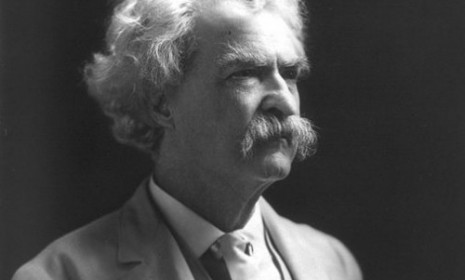Mark Twain's long-delayed autobiography
After a century of waiting, the world will finally get to see what America's greatest satirist really thought of his friends, countrymen, and lovers

A free daily email with the biggest news stories of the day – and the best features from TheWeek.com
You are now subscribed
Your newsletter sign-up was successful
At the time of his death in 1910, Mark Twain left behind an unedited 5,000-page manuscript of his autobiography with explicit instructions that the work not be made public for at least 100 years. In November, the University of California, Berkeley, will publish the first volume of the writings in what eventually will be a trilogy.
Why the century-long hold on publishing the work?
Nobody can say for sure, but Twain might have been worried that his grouchier opinions would hurt his public image. "He had doubts about God," notes Michael Shelden, author of a new account of Twain's final years, Man in White. He also might have wanted to avoid offending friends — the book contains many cruel observations about people Twain knew.
The Week
Escape your echo chamber. Get the facts behind the news, plus analysis from multiple perspectives.

Sign up for The Week's Free Newsletters
From our morning news briefing to a weekly Good News Newsletter, get the best of The Week delivered directly to your inbox.
From our morning news briefing to a weekly Good News Newsletter, get the best of The Week delivered directly to your inbox.
Has anyone seen the material before?
Yes, historians and biographers willing to travel to Berkeley have been able to read through the manuscript, and share relevant bits in their own books about Twain. Parts of it were also published as magazine excerpts prior to Twain's death. But University of California editors say that about half the material has never been seen by general audiences before.
Will the book include shocking revelations?
A few. For starters, Twain devotes a 400-page section to his "little-known but scandalous relationship with Isabel Van Kleek Lyon, who became his secretary after the death of his wife, Olivia, in 1904," according to Britain's Independent. Lyon even once bought Twain an electric vibrating sex toy — "Um, TMI, Mark," says Dan Fletcher in Time — but the relationship ended badly when Twain said she had "hypnotized" him into giving her control over his estate.
A free daily email with the biggest news stories of the day – and the best features from TheWeek.com
Is the autobiography likely to change how people think about Twain?
Maybe — it's certainly contrary to the common perception of him as "a sort of genteel Victorian," says Laura Trombley, author of a book about Lyon called Mark Twain's Other Woman. "In this document he calls [Isabel Van Kleek Lyon] a slut and says she tried to seduce him. It's completely at odds with the impression most people have of him." When the first volume comes out, people will see that Twain didn't spend his final years "basking in the adoration of fans. The autobiography will perhaps show that it wasn't such a happy time. He spent six months of the last year of his life writing a manuscript full of vitriol, saying things that he'd never said about anyone in print before."
Sources: Independent, Time, Guardian
-
 Why is the Trump administration talking about ‘Western civilization’?
Why is the Trump administration talking about ‘Western civilization’?Talking Points Rubio says Europe, US bonded by religion and ancestry
-
 Quentin Deranque: a student’s death energizes the French far right
Quentin Deranque: a student’s death energizes the French far rightIN THE SPOTLIGHT Reactions to the violent killing of an ultraconservative activist offer a glimpse at the culture wars roiling France ahead of next year’s elections
-
 Secured vs. unsecured loans: how do they differ and which is better?
Secured vs. unsecured loans: how do they differ and which is better?the explainer They are distinguished by the level of risk and the inclusion of collateral